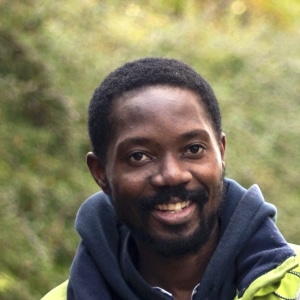Well! First and more importantly I am a proud Malawian, a nuts value chain enthusiast and a climate scientist. I grew up in a farming family where the proceeds from the farming venture paid for my university fees.
Currently, I am a year and a half into my PhD researcher at the Open University, School of Ecosystems, Earth and Environmental Studies based in Milton Keynes, UK. My research work is transdisciplinary where I try to understand the influence of environmental and social factors on smallholder macadamia production. I collect and analyze environmental data especially temperature, rainfall, vapour pressure and wind speed to evaluate how these influence macadamia tree growth, yields and quality. Apart from that, I work with local communities to understand what motivates them to grow macadamia trees and the major constraints to production of the trees. This is also one of the things that have led me to also focus on community engagement activities for informed research.

There is a lot of variations in my days, even within the same week. However, there two constant social events I never miss out. These are the daily 11am coffee and 5pm Friday beers within my School. My typical week is split between conducting soil analyses for chemical and physical parameters, running climate models on my computer (can take a minimum of 4 hours and sometimes a week to run a single model as I work with large data sets from Worldclim, Sentinel and Landsat imagery), reading papers and articles, code development for my models and data analysis, writing papers and my theses. In addition, I am member of the R-Club and post-graduate writing circles for informal trainings and just to code in a familiar environment and workshops on academic and research writing respectively. The remaining part of the week involves attending school seminars, responding to emails and indoor basketball.


There so many things that I have enjoyed the most doing my PhD. One of them is the flexibility in training opportunities and attending conferences with peers. I have had the chance to take up trainings which I believe are not easy to attend when doing a BSc or MSc and I am really greatful to my PIs for always pushing me to attend relevant trainings. I am also enjoying the opportunity to work with smallholder farmers which has always been at the center of my career.
The most challenging part has not being able to travel for field work due to covid19. This has mearnt that I have had to reschedule all my plans for this year. Despite that my PIs are very reasonable and I have been able to do other activities and modified my theses as well.

The OU based in Milton Keynes, is a fantastic place to study, very sociable and easy to maneuver as only PGRS and Staff are on campus. The people are supportive and always willing to assist. The little food delivery lobots within the city make it easy for food and grocery shopping. Travel within the city is also pretty easy and travel to London (45 mins), Northhampton, Luton and Bedford (20 mins), Oxford and Cambridge with only 1 hour away. If you love visiting places then the OU is for you. The OU also has some of the best laboratories in ecosystems, earth sciences, astrobiology.


I love to travel and see new places so everytime I get a free time am out with friends seeing places. Apart from that I like to play basketball as it clears my head and its a good way to get some air.
Check out his university profile, follow him on Twitter, LinkedIn, Google Scholar and ResearchGate, and read his papers using the links below:
University Profile | Twitter | LinkedIn | Google Scholar | ResearchGate
Does growing location and altitude influence macadamia tree yield
Effect of harvesting time on groundnut yield and yield components in Northern Mozambique

